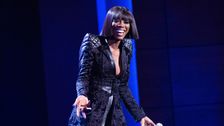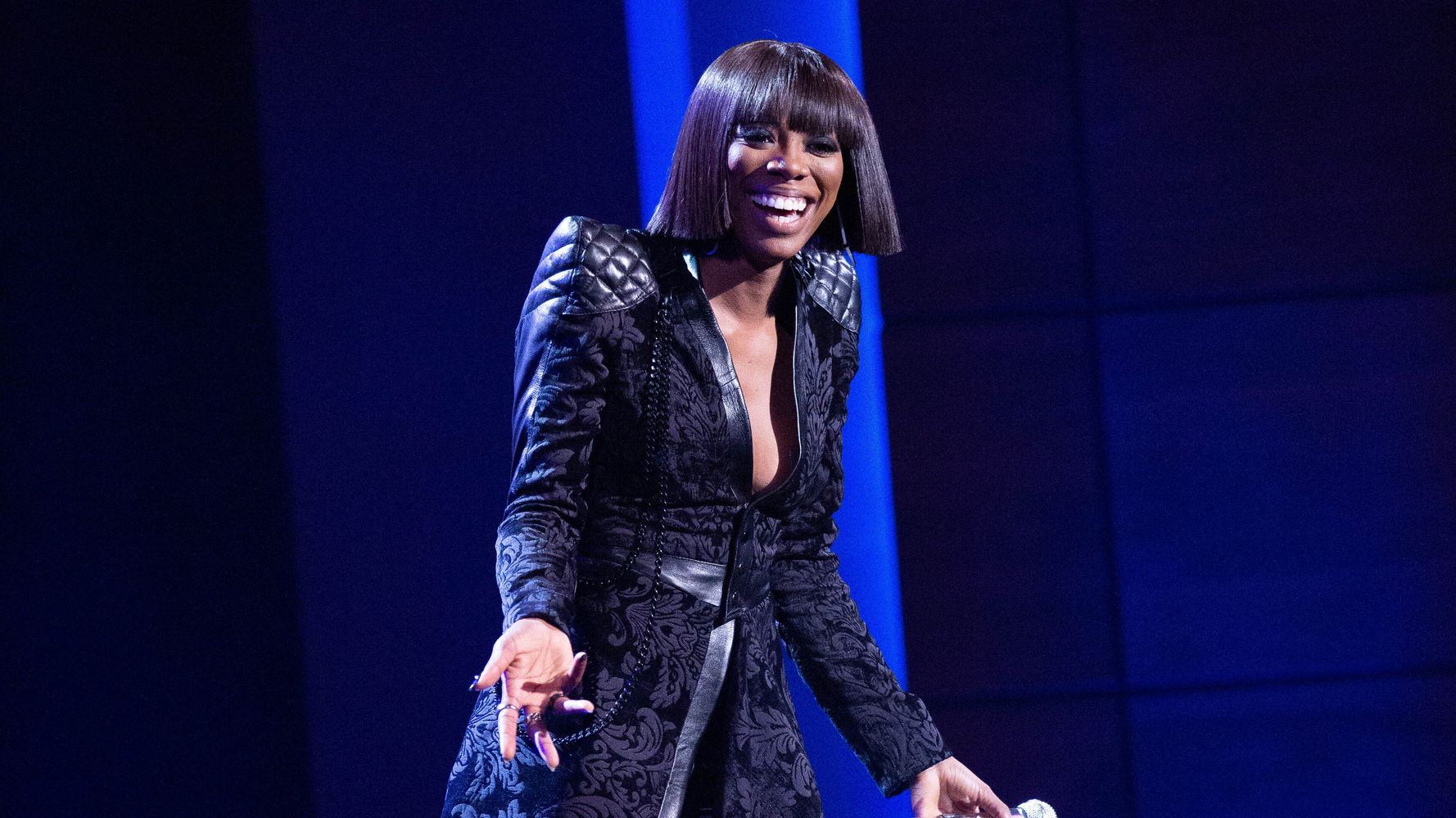[ad_1]

There’s a moment in Yvonne’s Orji’s new HBO comedy special, “Momma, I Made It!” where the 36-year-old comic tells a joke about how African Americans curse people out while Nigerians “put curses” on people. In the setup to the joke, in a thick Nigerian accent, Orji says one word: “Me?”
The audience responds in unison, laughing: “A whole me?”
If you’re West African, you likely know the cadence and the tone of “A whole me?” without even having to hear it, so ingrained is the phrase in the culture. And that’s what makes the moment so brilliant, a call and response that highlights an African cultural specificity that has rarely been at the center of such a major stage. This is what makes Orji’s comedy special debut exciting: It is as much an arrival for her as it is for first-generation Africans.
Orji is best known for playing Molly Carter on the HBO series “Insecure,” now in its fourth season. If you’re familiar with the show and the discourse around it, you’ll know that Molly is possibly one of the most maligned — and perhaps misunderstood — characters on TV right now. She plays Issa’s best friend, a perennially single, career-focused lawyer with what can only be described as a tendency toward being negative. In the current season of “Insecure,” Molly has especially been criticized for how she’s treated Issa during the breakdown and possible end of their friendship.
But Orji isn’t Molly, and on Saturday, when her comedy special airs, she will be reintroducing herself as the daughter of hardworking Nigerian immigrants, a woman whose ambition is as much fueled by her own personal drive as it is by the immigrant hustle imbued into the children of so many first-generation Nigerians. She’s also introducing herself as an observer of two cultures, a Black woman who engages with the African and American experience as fluidly as she switches up her accent throughout the set. Orji is excited about people getting to see a different side of her.
“Right now, [the fans] are mad at Molly. They’re really not trying to mess with her,” Orji says in a phone conversation with HuffPost. “And I’m like, ‘I need y’all to rap with Yvonne, though.’ Before there was Molly, there was Yvonne Anuli Orji. I was the person in the comedy session before I was Molly, but most people met me as Molly. I’m excited for people to rediscover me anew.”
Prior to getting her big break playing Molly on “Insecure” in 2016, Orji had been doing comedy for several years. She abandoned the prospect of a career in medicine — she received her master’s degree in public health from George Washington University — for a career in stand-up. Orji has toured the country with her set and even opened for Chris Rock during his “Total Blackout” tour in 2018. Her style is observational and conversational, like a kiki with a girlfriend over drinks.
In the special, filmed at The Howard Theatre in Washington, Orji covers everything from finances (“Don’t let these HBO checks fool you!”) to the Nigerian love of haggling to dealing with the high expectations of Nigerian parents. It toggles back and forth from Orji’s comedy set in The Howard Theatre to documentary-style footage of her with her parents and talking to fellow Nigerians in the streets of Lagos.
“You know, I think what [the special] shows the world is that Black is not a monolith,” Orji says. “I mean, we say it and say it and say it. But sometimes it takes someone showing you. There’s the West Indian experience. There’s the Caribbean experience. There’s the African experience. There’s the African American experience. I am excited for that young Nigerian girl to be like, ’Oh, snap. So I can be fully, wholly, totally myself? And it can be celebrated and appreciated?’”
Orji recalls seeing that kind of shift in understanding in her own parents when Kenyan Mexican actor Lupita Nyong’o won her Oscar in 2014.
“Suddenly my mom was like, ‘Your friend has one.’ I was like, ‘She don’t know me.’ But just seeing that Kenyan woman in the fullness of who she is, my mom was like, ‘Oh, OK. Well, maybe my daughter can. I understand what she wants to do.’ It’s as quick as that kind of representation,” Orji says. “Hopefully the next Nigerian writer or TV writer or TV actor or whatever — director, creative — they can see the special, and their mom can call them, like, ‘Oh, we got your friend on television.’”
Orji says that to Nigerian parents, you can either be a doctor, a lawyer, an engineer or a ‘disappointment.’
The special is airing at an interesting moment in America. We’re all desperately in need of a laugh. We’re all also (if we’re paying attention, that is) deeply contemplating what it means to be Black in America. Orji may play an African American woman on one of the Blackest shows on TV, but in real life, she was born in Nigeria and grew up in Maryland. The Blackness she explores in the special, then, exists in the in-between. Many of her first-generation Nigerian peers in entertainment and media have been called out for anti-Blackness in the past. It’s a tension that continues to plague the diaspora, a tension that Orji says she is aware of.
“Our parents’ generation, especially the ones that came from Nigeria, a lot of their messaging was like, ’OK, you can go to America. You can be in America, but not of America,’” Orji says. She says that she remembers once telling her father she identifies as Nigerian American, a concept he didn’t understand. To her father’s generation, Orji says, seeing the way Black people are treated in America has created a kind of distance.
But Yvonne wants to bridge the gap. “I rep my Nigerianness to the fullest. I love my country. I love being African. I love it. Even in our flaws, I love it. At the same time, I’m badly well aware that America has afforded me the ability to even have a dream, to be a successful female comedian,” she says. What is that? “That’s not a thing that in Nigeria where I could be like, ‘You know what I’m going to make a living off of? Telling jokes.’ In doing the special, I’m grateful that I got to kiss both of those worlds in one. A nice little Hershey Kiss moment of being like, ‘Yo, I honor my lineage. I honor my heritage. I also honor this moment of Blackness.’”
In this current moment of protest and hyperawareness around the realities of anti-Blackness in America, Orji says that Africans need to pull up for their African American counterparts. “It’s a good time to remind our African brothers and sisters that, like, hey, this fight in America is also ours. How Black people are seen anywhere in the world is very similar. You know what I mean? We saw what was happening to Blacks and Africans in China when coronavirus first hit. It’s like, hey, just because it’s not in America, it doesn’t mean it’s not your problem. We were all colonized.”
There’s a great joke in the documentary side of the special where Orji says that to Nigerian parents, you can either be a doctor, a lawyer, an engineer or a “disappointment.” Abandoning her degree to pursue comedy, then, was a true leap of faith for Orji — one that clearly paid off. There’s the show, the speciala and a memoir on the way. But even though the special is called “Momma, I Made It!” does she still experience the pressure of being the child of African immigrant parents?
“I think I’m scratching the surface. It’s like, ‘OK. You have done everything. That’s good. Now can you get married?’ You’re like, ‘God, dang it. Just give me a second to enjoy something I’ve been trying to do.’ And it’s not even from parents. It’s from everybody else. It’s like, ‘Well, the sacrifice for her making it is that she’s lonely.’ It’s like, ‘Guys, I might be OK.’”
For Orji, the “pendulum is always swinging.” She’s worked hard to get to where she is, but she believes God has much, much more in store. In that sense, “Momma, I Made It!” is a fun comedy debut, but more than that, it’s laying the foundation and the groundwork for Orji’s next move, for life after “Insecure,” life after Molly. Whatever moves she makes, she wants them to be big.
“I want to take over the world. I’m just, like, ‘You know what? I want to own everything,”’ Orji says. “It’s like, ‘Wait, what? How?’ I don’t know, but we’ll figure out how to own everything.”
Calling all HuffPost superfans!
Sign up for membership to become a founding member and help shape HuffPost’s next chapter
[ad_2]
Source link

